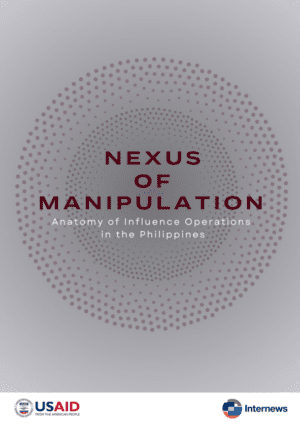Influence operations (IOs), conducted by both domestic and foreign actors, have increasingly threatened information ecosystems. In recent years, research and investigations have documented how IOs seek to manipulate public opinion, disrupt democratic processes, and advance specific geopolitical or ideological agendas. Focusing on key incidents and collaborative efforts, this playbook examines the nature and impact of IOs, and explores tools and responses to protect the media and information environment in the Philippines.
In September 2020, Facebook dismantled fake accounts from the Philippines and China that supported then-President Rodrigo Duterte and his daughter while promoting Beijing’s interests in the South China Sea. In January 2022, Twitter (now X) suspended hundreds of accounts promoting presidential candidate Ferdinand “Bongbong” Marcos Jr. for violating spam and manipulation policies. By mid-May of that year, Meta had removed 15,000 accounts for inauthentic behavior. Pro-Marcos accounts coordinated hashtags and manipulated public perception during the election season.
These operations show the sophisticated strategies used to capture public attention and manipulate opinions through seemingly organic, locally produced content. They also underscore that IOs in the Philippines do more than spread false information. They use hyper-partisan narratives to capture attention, mobilize audiences, and shape political discourse, including influencing elections. The divisive information they promote undermines trust, heightens polarization, and disrupts and weakens democratic processes in the Philippines.
In response to the threat from disinformation campaigns and IOs, including foreign information manipulation and interference (FIMI), the Initiative for Media Freedom (IMF) established a network of Philippine and global civil society and media organizations in mid-2023 to identify, analyze, and investigate IOs in the Philippines. IMF is a five-year program implemented by Internews and funded by the United States Agency for International Development (USAID). Its objectives include supporting an environment for a free press, enhancing the capacity of institutions to counter disinformation, and supporting media self-regulation. Under the IMF activity called PH-PROTECT, this collaboration has facilitated rapid information-sharing, comprehensive investigations, and public access to findings. It has enhanced the verification and digital investigation skills of local newsrooms, which are crucial in promoting information integrity and fostering societal trust and resilience.
The network has developed a broad framework for detecting IOs, which integrates guiding principles and existing literature from Meta, the European Union’s European External Action Service (EEAS), and counter-IO experts like the DISARM Foundation, among others. This framework defines influence operations as coordinated efforts by state, nonstate, and proxy actors to manipulate information in pursuit of financial, geopolitical, cultural, ideological, or policy goals. IOs use disinformation, propaganda, and harmful content spread through deceptive and inauthentic methods in various media to disrupt democratic values, sociopolitical stability, and public safety. Techniques such as distributed denial of service (DDoS) attacks and hacking may be used to undermine reliable information.
The network’s approach is grounded in a “learning by doing” methodology. This year-long partnership has collected various cases of domestic and foreign IOs, which have helped build understanding of these issues. These cases have served as a launchpad for a more detailed review of incidents affecting the Philippine information ecosystem.
The Philippines has a remarkable diversity of IO actors employing specific behaviors, content strategies, and varying degrees of reach to achieve their objectives. IO actors often use multiple platforms such as YouTube channels, Facebook pages, hyper-partisan content creators, and vloggers. They repurpose content from other malign actors, leveraging entertainment to forge links with political figures.
These operations use a wide range of tactics, including cross-platform coordinated inauthentic behavior (CIB), creation of dubious sites and accounts, impersonation of legitimate entities, and cyberattacks. Domestic IOs often follow a cascading pattern: hyper-partisan vloggers post content on YouTube, which is then embedded on dubious websites and amplified by Facebook accounts. Foreign IOs typically start with state media narratives echoed by experts, leading to a flood of content across platforms.
The IMF partners have observed a growing trend of using lesser-known websites and social media to disseminate false claims and propaganda. Malign actors mirror content on platforms like Bilibili and ViralPitch to maximize monetization and broaden their reach, increasingly using TikTok/Douyin, WeChat, Weibo, Baijahao, NetEase, and Guancha.
The network has tracked several prominent narratives in the Philippine information ecosystem. These include efforts to support or discredit the Marcos and Duterte families, undermine ties between the Philippines and its allies, challenge the 2016 Hague ruling on maritime rights favoring the Philippines, and defend China’s aggression in the West Philippine Sea. Chinese state media have also attacked the IMF, its donor, Internews, and partners.
Given the complex nature of IOs in the Philippines, effective countermeasures require a well-defined plan and a whole-of-society approach. This involves investing in social media monitoring tools, fact-checking platforms, open-source intelligence (OSINT), and investigative journalism to monitor and detect these operations. Developing defensive communication strategies is essential for disseminating accurate information and preempting IOs. Public awareness and media literacy programs are crucial for equipping citizens with the critical thinking skills needed to identify and resist IO narratives.
Utilizing technology, including high-quality translation services, gamification, and centralized repositories for tracking IO actors, can enhance efforts to counter IOs. Collaboration and information-sharing among public and private stakeholders are vital for addressing emerging narratives and tactics. Regulations targeted at malign IOs should be balanced to protect free expression.
As IOs continue to evolve, it is essential to continually adapt and refine countermeasures so the Philippines can robustly safeguard the integrity of its media and information landscape and its democratic values.
This playbook is made possible by the support of the American People through the United States Agency for International Development (USAID). The content of this playbook is the sole responsibility of Internews under the Initiative for Media Freedom (IMF) project. It does not necessarily reflect the views of USAID or the United States Government.
